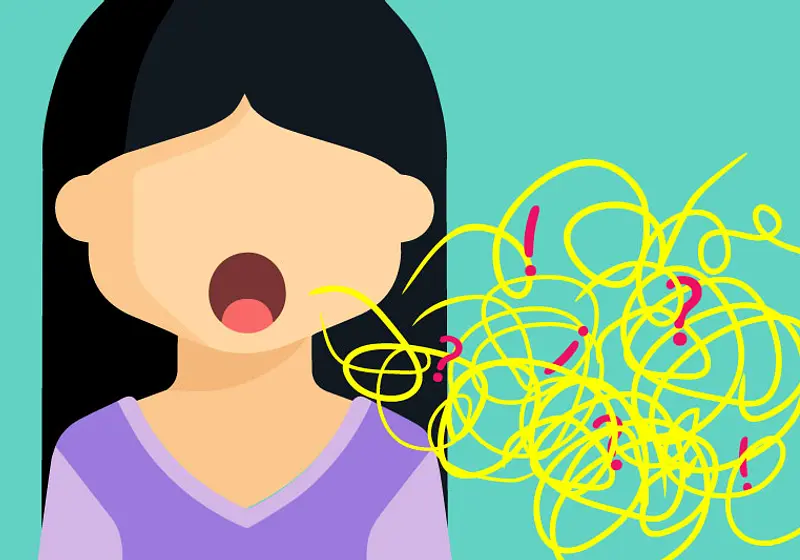Stuttering is the repetition of sounds and syllables. Some have a severe stutter and some don’t. Having it is difficult and sometimes painful, especially while being in school. Despite the negative feelings it can bring to one's life, it can positively impact perspectives and lifestyles.
I’ve had a stutter since before high school (grade 7) and having it has impacted my life and views in multiple ways. I wouldn’t say I have a severe stutter, but it’s definitely noticeable. It has made things like reading in class, ordering food, and even saying my name difficult.
I guess at home I don’t stutter often, but at school or anywhere besides my house, I will stutter. The simplest way of describing what it feels like is that there is something squeezing my throat, keeping me from speaking.
One night, I was scrolling on YouTube and came across a video of a segment of Steve Harvey’s talk show. In the audience was a 25-year-old girl with a stutter and she asked him for advice, knowing that he once had a stutter as well. In his response, he mentioned that he had to learn that there wasn’t anything physically wrong with him.
This stood out to me the most because it altered the way I viewed myself and my stutter. Although sometimes I forget that there’s nothing wrong with me, I try to remember what he said because it’s simply the truth. I’ve only met a few people who deal with stuttering and I try my best to encourage them in any way possible because I get it.
I once had to give a presentation and I stuttered all throughout it. It felt discouraging but with the help of my supportive friends, I was able to remember that I can’t do anything about the way I speak and that there just isn’t anything wrong with me.
They don't even know the pain, man - Steve Harvey
On the topic of speech therapists, Steve expressed that most of the people who work with kids to help them cope with or stop stuttering often have not experienced stuttering themselves. I agree because how can you help someone when you don’t have any knowledge of what it mentally and physically feels like to be in their shoes? It’s a frustrating and painful experience for many, especially for kids who have to grow up with it.
Speaking slowly, creating shorter sentences and retelling stories is not what people need. Simply having constant comfort and support is what can help stutterers cope better, because you will never know how hard someone is struggling with it until they tell you.
This doesn’t only apply to speech therapists but to everyone in general. For example, explaining to people at school about how I am uncomfortable presenting or reading in front of the class is often really frustrating because they don’t understand. They try their best to give me advice, but I wish I could just express that it’s not going to do anything. I know people have the best intentions to help me, but stuttering comes with an internal conflict of fear.
With the range of themes movies and shows cover, stuttering has been included in some. Those who act as stutterers are playing the roles of victims of bullying. They show kids with ‘stutters’ getting teased and laughed at by others at school.
This doesn’t really help the views actual stutterers have on themselves. It’s a put-down and makes them believe that that’s what’s going to happen in public.
I rewatched Parental Guidance (2012) and there’s a young boy acting as a stutterer. He goes to speech therapy and gets bullied. Eventually, throughout the movie, his grandfather lets him listen to a recorded sports commentary.
You see that this small thing impacts him towards the end when he gets on stage and recites every line from the recording. His words effortlessly flow one by one. In this way, the movie isn’t focused on the negatives of stuttering but instead on the positives.
It’s an encouraging ending and I feel that people, stutterers or not, can learn a lot from this. So, let’s stop teasing and acknowledging the negatives. Begin encouraging stutterers to use their voice for the things they are passionate about and want people to hear.
What I have learned so far with my experience with my stutter is that patience is important, and that’s just a part of who I am. With the frustrating seconds of struggling to finish my sentences, I’ve used those times to be patient with myself. To do this, I remember that I want people to be patient with me, so why shouldn’t I also be patient with myself?
After some time, I accepted that stuttering makes me, me. I can’t imagine how I would be without it because, in some ways, I am grateful for it. That may seem strange, but it has made me more mindful of those around me. We never really know what people may be dealing with and it’s only best if we are kind and considerate to everyone.
My stutter sculpted me into me. I would not trade all the years of pain, frustration, embarrassment, and struggle if I had to surrender one moment of who I ended up being and continue to become.
If you are someone who is dealing with a stutter, you are not alone. It will be difficult sometimes but you will find that it makes you, you. With the nature of conformity, people around us may seem to “fit in” because they follow the trends, wear the same types of clothing and talk the same way.
Having a stutter can make you stand out, not negatively, but positively. Our purpose is to be our authentic selves. To do this, you must embrace your stutter.
Yes, that may be difficult, but you can do it. Embracing it begins with self-acceptance.
When it gets hard, remember that there are so many people experiencing stuttering or other speech impediments. Your journey could help them conquer the fear stuttering leads to. Celebrities like Emily Blunt and Ed Sheeran have talked about their experience, encouraging many people, especially kids, to use their voices, despite the interruption of their stutters.
It's nothing to be ashamed of to have a stutter.
I don’t know what other advice to give you when I’m still on my journey. It’s just important to remember that there are people who love you and want to be there for you as best as they can. It’s easy to feel alone when you have a stutter, but it doesn’t have to be like that.
My family and friends are constantly there for me and they’ve all helped me along my journey with stuttering. With them, they have made me feel confident, loved, and appreciated. They listen to me and that’s something you should take in.
People who truly want to be there for you will listen to what you have to say. Your voice will always matter.
Stuttering is a challenge sometimes but can end up being a blessing because it can better your views on others around you. Despite the frustration, you will see how it can make you calmer, patient and understanding. I've learned so much from it and I believe that whether you have a stutter or a different impediment, you are able to accomplish more than you even know. It begins with self-acceptance!
For more information on stuttering, check the National Stuttering Association and SAY: Stuttering Association.















